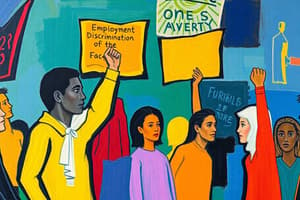Podcast
Questions and Answers
What are some common types of employment contracts?
What are some common types of employment contracts?
Permanent contracts, Fixed-term contracts, Casual contracts
What are some tasks handled by HR professionals?
What are some tasks handled by HR professionals?
Hiring, onboarding, performance management, employee relations
What are some components of benefits and compensation packages?
What are some components of benefits and compensation packages?
Healthcare, dental, vision, life insurance, retirement plans, salary, bonuses, stock options
What are some notable employment trends mentioned in the text?
What are some notable employment trends mentioned in the text?
What is the role of labor laws in the employment relationship?
What is the role of labor laws in the employment relationship?
What is the simplest definition of employment?
What is the simplest definition of employment?
Describe the two-way nature of the employment relationship.
Describe the two-way nature of the employment relationship.
What are the different forms that employment can take?
What are the different forms that employment can take?
What are labor laws aimed at achieving?
What are labor laws aimed at achieving?
What are the key components necessary to sustain the employment relationship?
What are the key components necessary to sustain the employment relationship?
Flashcards are hidden until you start studying
Study Notes
Title: Navigating the World of Employment: A Comprehensive Guide
Employment, a complex and dynamic facet of modern life, encompasses the relationship between individuals and the organizations they work for. From entry-level positions to strategic leadership roles, employment offers a myriad of opportunities that shape our professional journey and personal growth. In this article, we'll unpack the concept of employment, explore its various aspects, and delve into some of the most pertinent subtopics.
1. The Nature of Employment
Employment, in its simplest terms, refers to the arrangement where an individual provides services to an organization in exchange for remuneration. This relationship is typically governed by a contract, which outlines the terms and conditions of the agreement. Employment can take the form of full-time, part-time, temporary, or freelance work.
2. The Dynamics of the Employment Relationship
The employment relationship is a two-way street. On one side, the employer benefits from the skills and labor of the employee, while on the other, the employee derives income and professional growth from their work. To sustain this relationship, both parties must maintain open communication, fair compensation, and a supportive work environment.
3. The Role of Labor Laws
Labor laws are legal guidelines aimed at protecting employees' rights and ensuring fair labor practices. These laws cover topics such as minimum wage, overtime pay, workplace safety, and workplace discrimination. Labor laws vary from country to country and are subject to change, so it's essential to stay informed about the rules that apply to your specific situation.
4. Types of Employment Contracts
There are different types of employment contracts, each with its unique set of terms and conditions. Some common types of contracts include:
- Permanent contracts: These contracts offer long-term job security and are usually for indefinite periods.
- Fixed-term contracts: These contracts have a specific duration and are typically used for temporary positions or projects.
- Casual contracts: These contracts offer no job security and are typically used for short-term or seasonal work.
5. The Importance of HR
Human Resources (HR) departments play a critical role in managing the employment relationship. HR professionals handle tasks such as hiring, onboarding, performance management, and employee relations. HR professionals must maintain a fair and impartial approach to ensure a supportive workplace culture that fosters employee engagement and productivity.
6. The Role of Benefits and Compensation
Benefits and compensation packages are essential components of employment. Benefits typically include healthcare, dental, vision, life insurance, and retirement plans. Compensation packages may include salary, bonuses, stock options, and other forms of remuneration. Employers must ensure that their benefits and compensation packages are competitive, fair, and reflective of employees' contributions to the organization.
7. Employment Trends
The world of employment is constantly evolving. Some of the most notable employment trends include:
- The gig economy: The gig economy refers to the practice of working on a project, task, or short-term basis. Gig workers may work for multiple employers simultaneously and have more flexibility than traditional employees.
- Remote work: Remote work refers to the practice of working from a location other than a traditional office. Remote work has become increasingly popular during the COVID-19 pandemic, with many employers offering their employees the option to work from home.
- Artificial intelligence and automation: Artificial intelligence and automation are transforming the world of work. These technologies are being used to streamline processes, reduce costs, and increase efficiency.
8. The Future of Employment
The future of employment is uncertain, but it is clear that the nature of work will continue to evolve. As technology advances, new opportunities for remote and flexible work are likely to emerge. The gig economy will likely continue to grow, offering more flexibility and independence to workers. Employers will need to adapt to these changing dynamics and adopt new strategies to attract and retain top talent.
In conclusion, employment is a complex and dynamic field that offers a multitude of opportunities and challenges. By understanding the different aspects of employment, labor laws, and employment trends, we can better navigate the world of work and achieve our professional goals. As the nature of work continues to evolve, it's essential to stay informed and adapt to new trends and technologies to remain competitive in the job market.
Studying That Suits You
Use AI to generate personalized quizzes and flashcards to suit your learning preferences.




